100 years ago was born the Soviet intelligence officer and saboteur Ivan Kudrya
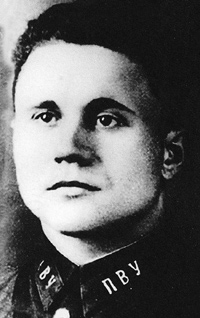
They were young, beautiful, wanted love and happiness. They met in safe houses and feared betrayal.
Only 20 years after the end of the war, Ivan Kudri and his group were posthumously taken out of the underground. Why did they remain silent so long?
The author of this article managed to look through several interesting documents from the archives of the former KGB and kindly provided by the historian Tatyana Evstafyeva materials archive of the Central Committee of the Communist Party (Bolshevik). Read again, they, I hope, will shed light on some questions that have not yet been clarified. Perhaps they will put new ones.
"Residents (all persons) are forbidden to go outside for 18 to 5 hours in German time. Violators of this order will be shot. .
"Commandant of Kiev"
(The Ukrainian Newspaper, September 29, 1941)
"IVAN, UNDEFINED ON THE ADVICE, BELIEVES ITSELF HEAVY ... LOVED IN THE ARTIST - PARADISE"
Raisa translated her watch for two hours ago. She could go out after 18. Like all artists, she received special permission. Otherwise, how would she come home from the plays? However, as a rule, I will accept the Kiev Opera Raisa Okipnaya to the house accompanied by officers.
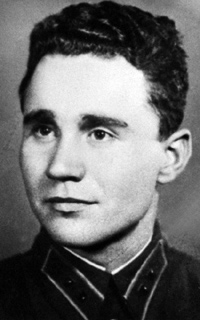 |
| Ivan Kudrya (operative pseudonym Maxim) led an underground group in occupied Kiev. Killed in the Gestapo torture chambers in July 1943 |
She was sympathetic to the head of the Ukrainian police Colonel Grib, chief of the city police Major Shtunde, deputy chief of the general commissariat for the Kiev region von Bolhausen. In the theater they gossiped that one Hungarian general offered her hands and hearts and she promised to think.
Ivan Kudrya was at the performances of Raya, when she got a ticket or a counter, more often just presented her a bouquet at the service entrance. Once, while sitting in the hall, he was in his mind making up a plan for the explosion of the theater during a large meeting of the Ukrainian and German leaders. At the last moment the meeting was canceled.
The lovers did not want to leave, and they, if they dropped out serene minutes, went to where the couple usually stroll - to the Dnieper park. Past the ruins of Khreshchatyk, past the creaking of the gallows across the Bessarabian market, past German patrols. Several months in the rear of the enemy, balancing on the edge of the blade did their job, they had a dull feeling of danger.
Dmitry Sobolev, another Chekist, left, like Kudrya, in occupied Kiev for reconnaissance and sabotage work, saw and grumbled: "Come on!". They did not listen. When I learned that they were arrested, I opened a school notebook, which I asked the daughter of a friend of the underground worker to ask for, and by the light of the cinder (only the Germans used electricity), wrote:
"Ivan, despite the advice, behaved inadvertently. I met and walked around the parks, once. Under the constant supervision of the Gestapo. I fell in love with an actress - Paradise. Walked with her in parks and squares every day, met her at the theater, saw him home, offered flowers. "
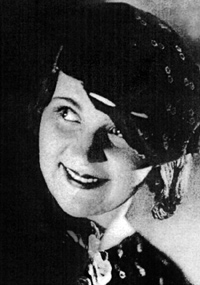 |
| Opera prima Raisa Okipnaya enjoyed success with German connoisseurs of high art |
This was one of the points of Sobolev's report on the reasons for the failure of the Koudri group. He wrote in case he suddenly falls through. Someone will find a notebook, find out what happened. Dmitry Sobolev himself was several years older than Ivan Kudri, more cautious and prudent, so stayed eight months longer.
And what if Sobolev wrote what he suspected, but did not know for sure? From various testimonies about the relationship of scouts left in Kiev, it seems that they may have been unknowingly competing with each other in audacity, courage, and luck. Is it because Sobolev's record of Kudra is sinfully detached severity?
But here we find in the case one more direct evidence - Lydia Miroshnichenko, one of Raisa Okipnaya's friends:
"Ivan Danilovich often met with Paradise, they were bound not only by underground work, but also by mutual deep respect, which turned into mutual love."
"PARADISE TAKEN MY TUFFY BEFORE THE ARREST AND MONEY SO AND I DID NOT."
The closest friend of Raisa Okipnoy was Evgenia Bremer. Despite the significant difference in age (Ray in 41-th turned 27 years old, Genet - 41 years), they were mentally close. The daughter of a prominent Bolshevik, a Russian German, Eugene at 20 years volunteered for the Red Army, married a Chekist and after his execution spent a year in prison as the wife of the "enemy of the people."
Zhenya and Raya lived in the same house on Chkalov Street, 32. Together, they rescued several Red Army soldiers who had fallen into the Darnitsa POW camp. They were called their relatives and "taken home." Sometimes such a focus took place. Evgenia was helped by her status as Volksdeutsche.
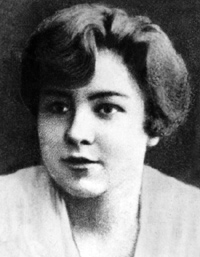 |
| A close friend of Okipnoy Evgenia Bremer was the daughter of a prominent Bolshevik, a Russian German. At the age of 20 she volunteered to join the Red Army, married a Chekist and, after his execution, spent a year in prison as the wife of an "enemy of the people" |
Often, friends flirted with a couple of German connoisseurs of the Kiev opera and other officers who were interested in the underground. From Lydia Miroshnichenko's letter:
One day a woman, seeing Paradise on the other side of the street, almost rushed to her with tears in her eyes, hugged, kissed. She said that she remembers her on the Vinnytsia theater, on the stage where Raisa shone before the war, and how great that they met again. The countrymen did not recognize the scale, but she was so sincere, and Raya so yearned for the past that they together reached the theater and quickly became friends.
The woman was called Natalia Frantsevna, the first German husband was Grunwald. She was nicknamed in the operetta manner by Nanette. She touched Paradise with a story about her second husband, who is suffering in the Gestapo prison.
Raya talked about Nanette Ivan, and he decided that a new acquaintance might be of interest to the underground. First of all, because he runs a laboratory in the hospital at Trehsvyatitelskaya, it means that she has access to chemicals. Cudra often had to forge documents and display old data on them. Besides, having entered into the group a worker of a confectionery factory named after Karl Marx, he planned to poison sweets. This alone gives an idea of the terrible reality in which these people existed. Probably, Kudrya justified his decision to go for such a diversion by the fact that sweets were mostly enjoyed by Germans and policemen.
When Raya introduced Nanette Ivan as her fiance, she threw another hook: lovers could come to her five-room apartment on Kirov Street. She's supposed to be at work all day, be at home, do not be shy.
"Ivan Danilovich (Curly.-Avt.) Told Zhenya and Rae that they would get to know the Germans and they would go to their house. On the same day Zhenya and Raya were at the market and met with the Germans, railwaymen, they began to visit their house. Zhenya often said: "I can not see them." But Ivan Danilovich said that we must endure and show that you are happy. "
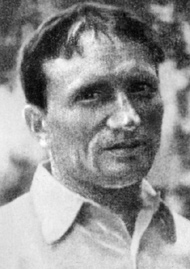 |
| The closest assistant and, in fact, deputy Ivan Kudri, the Ukrainian chekist Dmitry Sobolev |
The tempting offer made the underground workers forget caution. In an apartment on Pushkinskaya Street, 37 near Maria Gruzdova, whose husband, according to legend, was Ivan, lived also her mother, mother-in-law (mother of the first husband Gruzdeva, shot in the 37th) and their son. Raya's parents always have parents-mother and father-priest, who returned from a Stalin camp to an invalid.
Here we need to make a small digression and say that for the first time the group of Ivan Kurri was publicly spoken in 1963. Major KGB Major Viktor Drozdov, one of the co-workers of the chief chief of Soviet intelligence agents and saboteurs Pavel Sudoplatov, was detained in the affairs of the Kiev KGB underground. After the shooting of Beria and the arrest of Sudoplatov as "an accomplice of Beria," Viktor Drozdov was sent to retirement. But he found a second wind, managing the public reception of the popular newspaper Nedelya. The 20th anniversary of the Victory was approaching, and Drozdov suggested that the newspaper publish the material he had collected about his deceased colleague Ivan Kudra. The documentary story "Two Years Over the Catastrophe" was a huge success, Dovzhenko's studio put on it the eponymous film.
So Raisa Okipnaya thought about Vinnitsa before meeting with Nanetta. Curlya began to receive reports that the Germans were sending special troops there, starting some secret construction, preparing for the arrival of high ranks. He decided to find out what's what. Paradise volunteered to go there as if to visit the theater, began to bother about permission to travel to their German fans.
Curly could not know that we are talking about the construction of Hitler's rate, and did not assess the degree of risk. It was then that the secret agent of SD Nanette appeared. She was an outstanding actress and outplayed both singer Raisa Okipnaya and scout Ivan Kudri.
General Drozdov wrote about Nanette:
"... her husband, a Ukrainian journalist, communist, underground, dies in prison, and at this time Gestapo Sharm comes to see her - the same one who tortures her husband during interrogations. Soon she will become a special agent of the SD in Vinnitsa, and then in the Sudetenland. "
In the literary processing of the story "Two Years Over the Abyss", General Drozdov was assisted by journalist Yevseyev. Together they sought out Nanette, convicted, but released after the amnesty, which, by the way, was very outraged, and raised the issue of her backing, behind barbed wire, to the prosecutor's office.
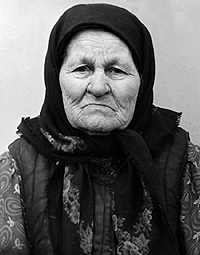 |
| Mother Ivan Kudry Anisiya Zakharievna raised her son without a husband, Father Vanya did not remember |
In their report, Drozdov and Yevseyev told that when the Kudri group was defeated, Nanetta Sharm's boss and lover made her confront with Raisa. Seeing the reception of the opera theater beaten to black bruises, Nanetta cried. Charming asked if she really felt sorry for the partisans. She answered: it's a pity, but it's not like an enemy.
Drozdov and Yevseyev, Nanetta described how Conquest looked at the interrogation: "Clothes are torn. She had my shoes on her legs ... Raya took my shoes before my arrest and did not give any money. "
The mention of the traitor we find in the Chronicle of current events: "Grunwald Natalia Frantsevna, born in 1912, was sentenced to 25 years. Her son, sentenced on a case with her, is in camp 35 camp camp in Perm. " And in another issue of the Chronicle: "Grunwald Natalia Frantsevna - the heroine (it should be said, anti-heroine.-Avt.) Of the film" Two Years Over the Abyss ". Arrested in the 1940s, sentenced to 25 years, amnestied in 56-year, but on personal orders of the Prosecutor General Rudenko in 62-year returned to the camp. In the charges brought against her, she does not admit her guilt. "
Somewhere out there, in Gulag's wilds, traces of Nanetta were lost.
"I had the task of being the wife of T. Koudri"
"In 1937, her husband Yaruta NS - a teacher at Kiev University - was arrested and shot (posthumously rehabilitated)."
That year, next to Ivan Kudray lived another woman - Maria Gruzdova. As it was determined by the legend with which he was left in Kiev, either the bride or the wife. According to the same legend, he was a teacher of the Ukrainian language Kondratyuk, the son of a repressed priest from the town of Merefa and arrived in Kiev to Gruzdova.
By the beginning of the war for four years, Maria was the widow of a teacher at Kyiv State University. From a certificate signed December 30, 1963 by the chairman of the Ukrainian KGB V. Nikitchenko:
 |
| After the arrest, the Germans tortured Raisa Okipnaya with a special cynicism, avenging her former delights |
The mention of Nikanor Yarut can be found in the so-called "Stalin lists" of people who were shot on Stalin's personal instructions or his immediate entourage. The verdict against N. Yaruta was carried out on June 26, 1937.
Some researchers believe that Maria Gruzdova did not know about the execution of her husband and hoped to cooperate with the authorities to ease his fate in the camp. But in V. Nikitchenko's certificate it says: "I willingly agreed to stay in Kiev for the assignment".
General Drozdov supported this opinion: "It is said that when she was asked to take her (to Maria Gruzdov - Auth. ) For Kudryu's apartment, she cried - not from fear, but from the consciousness that she, the wife of a man punished by Soviet power, is trusted with such an important Task, as the protection of the life of our scout. "
Two years after the rout, Gruzdov's group will get to the Great Land and present a report on the Kiev underground, which will be handed over to the People's Commissar of State Security Vsevolod Merkulov. In her report she said:
"I was tasked with being the wife of Comrade Kudry and by any means penetrating into society by using my acquaintances and drawing Comrade Kudri into this environment in order to disguise him and also to study the people who remained in Kiev upon the entry of the Germans ".
A pretty, at first sight, defenseless blonde, Mary was not lost under any circumstances. Not once she got into trouble, in which others would have disappeared, and she came out dry.
She found the right connections and became a housekeeper on Kuznechnaya Street (now Gorky), 4/6, where the Abwehr recruiting center was based. It was led by Major Mayer. His people selected agents mainly from Ukrainian policemen, prisoners of war, Red Army deserters, sometimes young, naive and hungry. Having signed the contract, everyone received a thousand rubles (1 mark was equal to 10 rubles), sausage, eight kilograms of flour, four kilos of sugar and cereals, after which Meyer sent them to the Poltava school of spies. Three months later the newly-made saboteurs were thrown into the Soviet rear.
Eventually it turned out that Mayer - before the war recruited a German spy, a native of the Kiev region, a graduate of the Kiev Polytechnic and that his name was Anton Milchevsky. In 1936, he was convicted of espionage, but in 1940, thanks to a treaty with Germany, was exiled on the exchange of prisoners. Very soon he returned to his former homeland in major shoulder straps. The KGB archives contains the record of Milchevsky-Mayer's interrogation of August 28, 1952, in which he recognizes his recruiting and intelligence activities in Kiev.
The windows of the apartment, where Maria Gruzdova kept her housekeeping, came out just on the windows of Mayer's secret apartment. As the husband of the housekeeper, Ivan Kudrya often went into the building at Kuznechnaya and soon began to have information about many of his visitors. The lists drawn up by Kudray helped to find most of them after the war. Maria had so much confidence in Mayer that he and she nearly sent her to the Poltava intelligence school.
Once, Curly, desperate to get in touch with the Center, he decided to cross the front line and personally report the situation to the authorities. On the way, he was arrested and locked up in the Darnytskyi camp. Ivan managed to scribble a note and pass it with some boy to Maria. She rushed and rescued him.
Maria was near, when on the street he forehead bumped into his former investigative Stepan Usata, who became an interpreter in the field gendarmerie. Despite Kudry's attempt to change his appearance, he grew a mustache, wore embroidered clothes and a flechet, "Moustached recognized him. But he did not surrender Kudryu to the Gestapo, but, on the contrary, Kudrya overturned Mustafa, and he began to bring Kudra information about the traitors. This must have the first mention of the suspicious activity of the Germans at Vinnitsa. Subsequently, Moustached, according to some reports, was shot in the Gestapo, on others - he left with the field gendarmerie during its redeployment.
Thanks to the story of Gruzdova, the episode with Usatym entered in a revised form into the film "The Scout Feat" (with Kadochnikov in the title role). In the famous scene on the steps of the cinema "Ars" the main character encounters a German intelligence officer who was an undercover NKVD, blackmailing him and forcing him to give out German secrets.
It seems that Mary deeply entered the role of bodyguard and wife of her boss Ivan Kurri. In the Moscow report, she dropped the phrase in her heart:
"Although I had terrible personal troubles with him (with Kudray.-Avt.), But this personal remains personal, and the general remains common, and I never mix it."
Can not you hear the notes of hurt pride here? Maybe Maria was jealous?
"THIS MY GROUP PRODUCED THOSE DIVERSION ACTS IN KIEV, WHICH SOME WORKERS OF OUR BODIES WRITTEN TO YOURSELF"
When preparing Kudri for the underground, the management was interested not so much by Gruzdov as her apartment in the 12-storey "skyscraper of Lev Ginzburg", which is the highest in the Russian Empire. From the windows of the house along Institutskaya Street, 16 (now the hotel "Ukraine"), an excellent overview of Khreshchatyk was opened.
The apartment was packed with weapons, ciphers, money, false documents and forms, clothes and food.
We saw, probably, Ivan Kudrya and Maria Gruzdova, as on September 19, 1941 on Khreshchatyk the first column of Germans walked. On the very next day after the invasion of the Ginzburg House, like all other buildings in Kiev, the first order of the German military commandant hung:
"All citizens of the city of Kiev and its environs immediately, within 24 hours, to hand over firearms, receivers and gas masks to the commandant's office. For non-execution - shooting! ".
The queue to the store "Children's World", where the receivers were taken from the public, did not run out for several days. It is believed that his receiver, stuffed with explosives, Kudrya brought in the back room on September 24. Historian Tatiana Evstafieva says that in his first report to Moscow, Ivan Kudrya reported on the explosion of the "Children's World".
It was necessary to break out to the "Children's World", as an explosive detonated in the commandant's office building, located on the opposite corner, detonated. It was said that a blast wave carried the commandant through the window and slammed into the asphalt.
However, in honor of the demolitions (now it seems to somebody - the hero stratum honor, and then they thought - Kiev brushed the muzzle of the Nazis, showed that it does not mean to enter the city yet), and another group of Chekists left in Kiev claimed.
It was a group of Viktor Kartashov, in close connection with which was Dmitry Sobolev. Sitting in 1946 in a Kiev prison on suspicion of betrayal, Kartashov wrote to his supervisor Pavel Sudoplatov, who personally sent him on assignment:
"I affirm and prove that it was my group that carried out those acts of sabotage in Kiev, attributed to themselves by some workers of our bodies."
After the war, Victor Kartashov was found guilty of treason, condemned to 25 years in the camps, but the term did not depart, because in 1950, at the age of 43, he died in prison.
Supporters of the two versions of the authorship of undermining Khreshchatyk could reconcile the assumption that the receivers stuffed with explosives had two, and maybe more - the number of clandestine groups. But Maria Gruzdova wrote in her report:
"Sobolev said that it was like their work ... I was not in the Lavra, but I heard that there were explosions."
Did Kudrya conceal his involvement in such a loud rally from her?
So, the "Children's World" and the commandant's office took off in the air. After that, the nearby "Star" cinema exploded. It was there that the German soldiers rested culturally. A real cannonade rattled on Khreshchatyk. Eyewitnesses said that the pigeons, stunned with a crash, flew up and immediately fell dead, roasted in the tongues of a multi-meter flame.
The next day, the Ginzburg House was blown up. Maria Gruzdova said in her report:
"I do not know how it happened, but the house was mined. All products, documents, weapons, passport forms, etc., were lost, because we simply could not bear all this. Why? Because the Germans drove out of the house to a single person, surrounded the entire area and no one was allowed to the house for a day. The Germans did not enter the house either, because they had accurate information that the house was mined. "
Curiously: the Germans "had accurate information that the house is mined", and the Kiev Chekists - no! Otherwise, it occurred to him to create a safe house for his resident in a house destined for destruction? Or vice versa - how could the mine be mined, where its scouts are based? And one more thing: how did Gruzdova know that the Germans "had accurate information"?
"WHERE MUFF RAINS GO AWAY"
Not only Kudrya, Gruzdova and her family lost their homes, livelihoods and ties, so the radio remotely left for the group in the house of Yevgeny Linkevich ceased to work very soon. The basement, where it was hidden, turned out to be damp, and the batteries went out of order. In addition, two radio operators who served the radio, attracted the attention of the police. I had to send them to the Greater Land.
Gruzdova engaged her connections, and they settled with Kudraya in an apartment on Pushkinskaya Street. He specifically chose the top floor, so that in an extreme situation one could walk on the roof. To remove German eyes, Maria got him a certificate from the medical institute, where he allegedly was enrolled as a student. Somehow the problem with money was solved. Judging by her testimony, they even had golden royal coins.
Surprisingly, but very quickly Kudrya assembled a new group. Then Zhenya Bremer and Raya Okipnaya got into it. But there was nowhere to take a radio and radio operators.
Moscow, very interested in the activities of Kudri, sent in October 1941 the Kiev-paratroopers Lydia and Anatoly Trusov. A radio operator flew with them, but with a failed landing, he crashed. It was impossible to deliver Trusov in one piece and walkie-talkie. But they got acquainted with many members of the Koudri group and on their return made a report about everything they saw.
From what Kudra managed to do, the Trusovs noted the creation of seven sabotage groups, the production and distribution of leaflets, the collection of material for the analysis of the economic situation in Kiev and surrounding areas, as well as:
"There is an absolutely complete picture of all the fortifications and mining, the existence of military schools and the location of the largest military headquarters and institutions, the mood and internal struggle of individual groups ... The group penetrated into the higher German circles through Zoya (referring to Raisa Okipnaya. .), Owning a beautiful voice, and her friend - German Zhenya. "
In turn, Kudrya asked the Center to give him the necessary things - a "walkie-talkie, miniature infernal cars" for tossing into pockets, devices for the destruction of individuals without sound, passport forms, occupation stamps. "
To the list Ivan added:
"Good stuff or clothes for the actress Zoe (Rae.-Avt.)." His favorite he wanted to give not only flowers.
About whether he gave greetings to the Greater Land for his real wife, the report of the liaisons is silent.
The famous scene from the "Seventeen Moments of Spring" at the cafe "Elephant" symbolized the unswerving fidelity of Maxim Maksimovitch Isaev-Stirlitz to his wife and motherland. Ivan Danilovich Kudri (operative pseudonym - Maxim), it turns out, was also a family, and somewhere far to the east were his mushroom rains of memory.
On November 17, 1938, in the questionnaire column "marital status," he told the telegraphic style:
"Married. Koshkina Kapitolina Ivanovna, home address: hotel "Select", room number - 25 ".
In the hotel they lived well, so that on May 29, 1941, he added his autobiography:
"I have a wife and two children. My wife is a member of the NKVD. "
In his personal file there were reports that Kapitolina Kudrya was four years younger than her husband and that one year before the war she had given him Arkasha, and in the year of the outbreak of war, Borya.
Raisa Okipnaya was also married. Her maiden name is Kapshuchenko. Raya married when she studied at the music school, from which she was expelled with a crash because of the arrest of her father-priest. The fate of the young wife Paul Okipnoy nothing is known.
The theme of the underground love of a married spy-communist and a married underground girl-singer was not welcomed. The closest military friend of Ivan Kudry was portrayed to Maria Gruzdov.
MOTHER DEALED THE PACKAGE AND SEEED THE NAIL OF RAI, AND IN IT - HER LINKED AND COLORED HAIR
In the apartment of Nanetta, Ivan and Raya not only met, but also listened to programs from Moscow, recorded front reports and printed leaflets on them. They brought their typewriter there, where the place of dislocation was being changed all the time. They also risked it, because they could easily be searched and arrested on the street.
In his notebook Dmitry Sobolev continued to list the reasons for the failure of Ivan Kudri:
"Dedicated Nat to the course of his work. He left her with a typewriter given him, a watering can (camera.-Avt.), Etc. Many chatted. Meanwhile, he knew that she had Gestapo workers at her apartment and that she had concealed, in her words, many owls. answer. Workers (apparently, she gave them up) ... In the house in which she lives, there are many apartments of the Gestapo. "
The resident's mistake was that, after trusting Raisa's recommendation, he did not arrange Nanetta's verification. He was not tormented by suspicions even when he decided to invite friends-undergrounds - Zhenya Bremer and Georges Dudkin - to Grunwald's luxurious apartment.
Actually, the day of his 30th birthday was in two days, but Ivan somehow decided to celebrate it on July 5th. This party cost them their lives.
From the diary of Dmitry Sobolev:
"I began to arrange meetings with Paradise in her apartment (Nanetta.-Avt.). I arranged a day for my name-day. I invited my Zhenya and Zhora ... On July 5, Ivan and Raia took a typewriter from Nata and were arrested in 15 minutes ... On the next day, not knowing about the arrest of Rai and Vanya, Zhenya and Zhora went to Nate to the polyclinic and together Went to walk. Near the house Korolenko, 33 Nata disappeared. They did not expect it, knowing that she would find them. A few minutes later Nata really approached them, and at the same time they were arrested. Zhora managed to escape on the way to the Gestapo. "
Maria Gruzdova miraculously managed to avoid arrest. From the letter of the head of the Ukrainian headquarters of the partisan movement Timofei Strokach to the People's Commissar of State Security Vsevolod Merkulov on May 27, 1943:
"With all the materials, in particular, with the shorthands of Hrusdova, who had the task of informing the Central Committee of the Communist Party (Bolsheviks) of the state of the Kiev underground party, Khrushchev N.S.
In view of a number of suspicious circumstances in the present materials, in particular about the existence of a direct assignment by Gruzdova from Ivan Kucherenko, who is currently conducting a provocative and treacherous work among the Kiev underground party - Comrade. Khrushchev expressed great suspicion with regard to Gruzdova and the information she provided. "
Over time, however, suspicions of Maria Gruzdova were dropped. By the 20th anniversary of the Victory among the other members of the Maxim group she was awarded the Order of the Patriotic War of the 1st degree.
Maria married the former Kiev underground worker Nikolai Slobodenyuk, along with whom she left Kiev and got into the partisan detachment of Popudrenko, from where she was sent to Moscow. Historian Tatiana Evstafieva said that she had once met with Nikolai Slobodenyuk. Maria Gruzdova was no longer alive, and he complained that his wife after the war was not allowed to teach at school. Perhaps, until the end and did not believe it.
About the last days of Ivan Kudri, who in the Gestapo prison kept saying that he was a student of Kondratyuk, is only one testimony. In one cell with Kudrey was Ivan Kucherenko, secretary of the underground Kiev regional committee and the Komsomol city committee, who miraculously managed to survive and who because of this was considered a traitor. From the report of Maria Gruzdova:
"One day or evening (as if he does not remember) a man was literally thrown at his cell. This man lay for two days, did not eat anything, did not drink, and with his blood flowed from his hands. Kondratyuk was already sitting for three months, and he was tortured all the time. When he was thrown into Kucherenko's cell, he was in such a condition that he could not speak, but only moaned ... The next time during the interrogation, the tortures continued. He was hung up and stabbed with needles under the toes and hands. This was done in the presence of Kucherenko. "
After the war, there were several women who were sitting with Zhenya Bremer in one cell, then with her mother, who was killed after her daughter. Neighbors said that Zhenya did not lose self-control until the last days. As an ethnic German woman she was given an improved ration, and some women envied.
Then Okipnoy and Bremer arranged a confrontation. In the morning Zhenya was dragged to the cell, and a few more days she suffered without sleep, because the mutilated body did not allow to sit or lie down.
The prison was in order - shot on Monday, Wednesday and Friday. Once the prison governor threw open the door to the cell and, looking at Zhenya, shouted: "Schnel!". He always screamed like this when he was leading to the execution. From the next cell, he also led Paradise. It was Friday, November 6th. And the day of execution of Ivan Kudri is unknown.
Without shudder, it is impossible to read the story of Raisa Okipnaya's mother published in one of the Kiev newspapers. Artist, apparently, the Germans tortured with a special cynicism, revenge for their former enthusiasm. One day a Gestapo employee brought her package to her parents. Mother unfolded it and saw Rai's sock, and in it - her tangled and bloody hair.
On that fateful evening of July 5, 1942, when Ivan Kudri and Raisa Okipnaya were arrested, the Gestapo searched his apartment on Pushkinskaya Street. In the drawer of Ivan's desk, they found a photo of Rai in the role of Carmen.
PS The site shram.kiev.ua is grateful to the editorial staff of the Gordon Boulevard and expresses gratitude for the assistance in writing the article to Stanislav Fyodorovich Vinnik, the former head of one of the units of the 9th KGB Service of the Ukrainian SSR, who in 1965 took part in the preparation of materials for the government awarding of Ivan Kurri And members of his group.


Comments
Commenting on, remember that the content and tone of your message can hurt the feelings of real people, show respect and tolerance to your interlocutors even if you do not share their opinion, your behavior in the conditions of freedom of expression and anonymity provided by the Internet, changes Not only virtual, but also the real world. All comments are hidden from the index, spam is controlled.